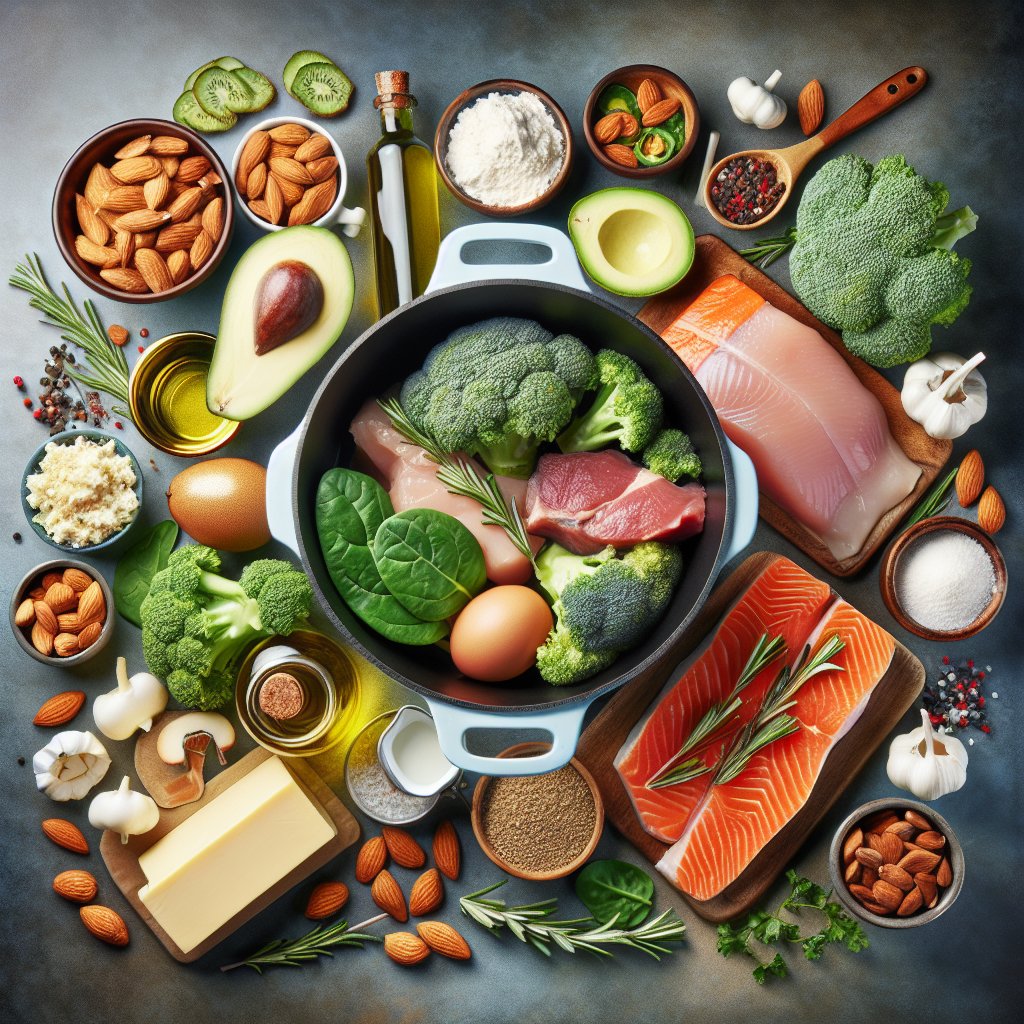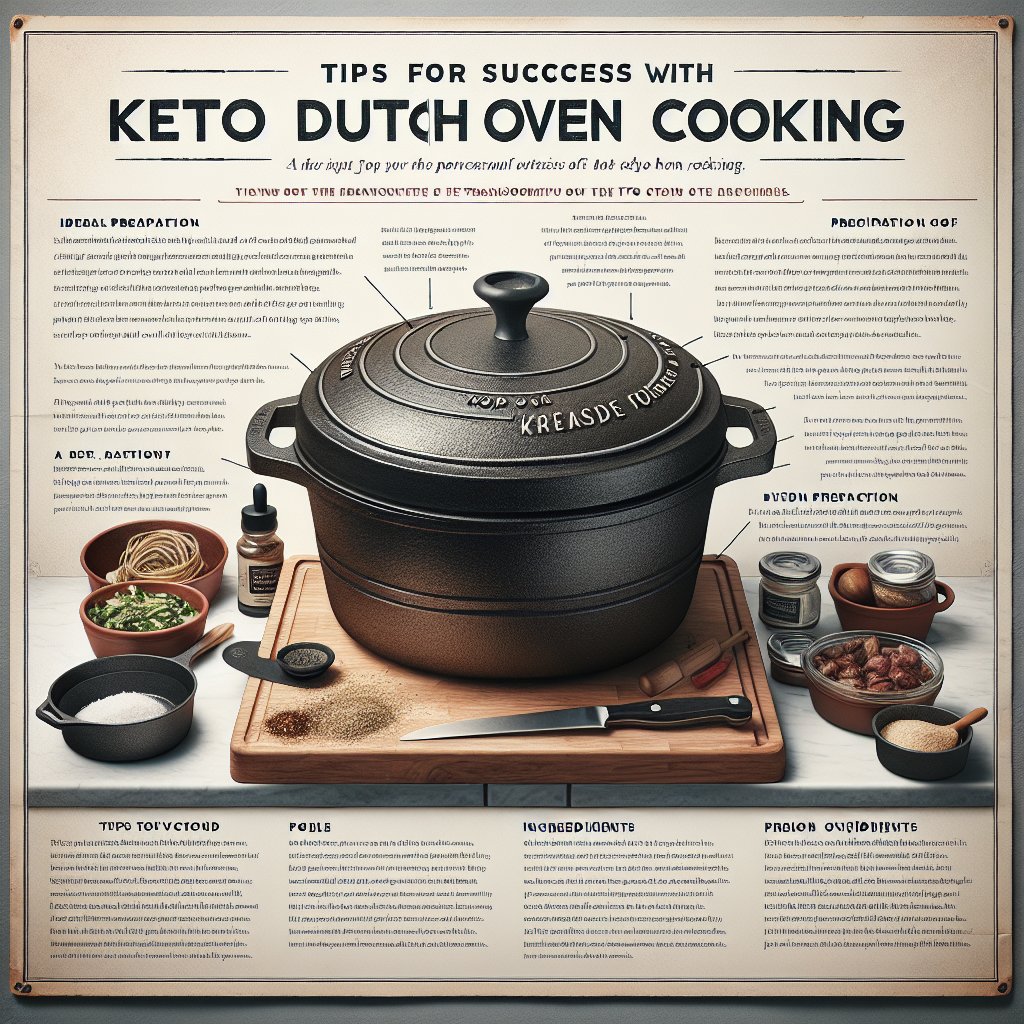Transform Your Keto Journey: Discover 5 Must-Try Keto Dutch Oven Recipes for Flavor and Ease!
I. Introduction to Keto Dutch Oven Recipes
A. Brief Explanation of the Ketogenic Diet and Its Benefits
The ketogenic diet, or keto for short, is a low-carb, high-fat diet that has gained popularity for its potential health benefits. By drastically reducing carbohydrate intake and replacing it with healthy fats, the body enters a metabolic state called ketosis. In ketosis, the body becomes incredibly efficient at burning fat for energy, which can aid in weight loss. Additionally, this diet may help improve mental clarity, reduce inflammation, and even support heart health by managing blood sugar levels and cholesterol.
B. Introduction to Dutch Oven Cooking
Dutch oven cooking is a versatile and time-honored culinary technique that can elevate your keto meals. A Dutch oven is a heavy-duty, cast-iron pot with a tight-fitting lid, perfect for slow-cooking, roasting, and baking. Its ability to evenly distribute heat makes it ideal for creating tender, flavorful dishes. Whether you’re simmering a hearty stew, roasting a savory meat dish, or baking a delectable low-carb casserole, a Dutch oven can handle it all with ease.
C. Overview of the Advantages of Cooking Keto Meals in a Dutch Oven
Cooking keto meals in a Dutch oven comes with a host of benefits. Firstly, the even heat distribution ensures that your ingredients cook thoroughly, enhancing the flavors and textures of your dishes. The tight seal of the lid helps retain moisture, making your meats succulent and your vegetables tender without the need for additional fats or oils. This method can also be a time-saver; the efficiency of slow-cooking means you can prepare large batches of keto-friendly meals with minimal effort, perfect for meal prepping. The idea of transforming simple ingredients into gourmet-like dishes with ease makes Dutch oven cooking an indispensable tool for your keto journey.
II. Benefits of Cooking Keto Meals in a Dutch Oven
A. Retention of Nutrients and Flavors
If you’ve ever wondered why Dutch ovens are hailed as kitchen must-haves, one big reason is their ability to retain nutrients and flavors. This is particularly beneficial when preparing keto meals, which often involve nutrient-dense vegetables, high-quality meats, and healthy fats. The thick walls and tight-fitting lid of a Dutch oven create a sealed environment that locks in steam and circulates moisture within the pot. This process minimizes nutrient loss and ensures that all the rich flavors of your keto-friendly ingredients stay intact, making your meals both healthy and delectable.
B. Even Cooking and Heat Distribution
One of the standout features of a Dutch oven is its ability to distribute heat evenly. This is crucial when cooking keto recipes that demand precise temperature control, such as slow-cooked meats or baked dishes loaded with cheese and cream. The heavy construction of Dutch ovens allows for steady and uniform heating, ensuring that every part of your dish is cooked to perfection. Say goodbye to hot spots or undercooked areas; with a Dutch oven, your keto creations will be evenly cooked every single time.
C. Easy Cleanup and Minimal Dishes
Who doesn’t love a kitchen tool that saves time on cleanup? Dutch ovens excel in this area too. Since you can often prepare an entire meal in just one pot, you’ll have fewer dishes to wash after enjoying your keto feast. Most modern Dutch ovens come with an easy-to-clean enamel coating that prevents food from sticking. That means less scrubbing and more time savoring your delicious, keto-friendly meals. Plus, fewer pots and pans mean a less cluttered kitchen, making cooking a more enjoyable experience altogether.
D. Suitable for Batch Cooking and Meal Prepping
If you’re on a keto diet, meal prepping can be a game-changer, and Dutch ovens are perfect for the job. These versatile pots are designed for large-batch cooking, allowing you to prepare multiple servings of your favorite keto recipes all at once. This is ideal for those busy weeks when you don’t have time to cook every day. Simply prepare your meals in advance, portion them out, and store them for later! With a Dutch oven, batch cooking your keto recipes becomes effortless, so you can always have nutritious meals ready to go.
III. Essential Ingredients for Keto Dutch Oven Recipes
When it comes to creating mouthwatering meals with your trusty Dutch oven, ensuring you have the right ingredients is crucial. Whether you’re just starting your keto journey or you’re a seasoned veteran, the following essentials will make your keto Dutch oven recipes not only delicious but also nutritious.
A. High-Quality Proteins
Quality protein is the cornerstone of any keto diet, and Dutch oven cooking allows these proteins to shine. Think grass-fed beef, free-range chicken, and wild-caught fish. These choices are packed with nutrients and healthy fats, essential for maintaining ketosis. Slow-cooked in a Dutch oven, they become tender and flavorful, perfect for hearty stews and succulent roasts.
B. Healthy Fats
Fats are fuel on the keto diet, and the right kinds can take your Dutch oven recipes to the next level. Look for sources like avocado oil, coconut oil, ghee, and lard. These fats not only provide essential energy but also enhance the taste and texture of your dishes. For example, adding a dollop of ghee to a simmering curry can impart a rich, buttery flavor that is simply divine.
C. Low-Carb Vegetables
Vegetables are not off-limits on keto—in fact, they are a vital part. Focus on low-carb options like leafy greens, cauliflower, zucchini, and bell peppers. These can be seamlessly integrated into your Dutch oven recipes, providing fiber, vitamins, and minerals without the carb overload. Roasted vegetable medleys and chunky vegetable stews are both excellent choices.
D. Flavorful Herbs and Spices
One of the beauties of Dutch oven cooking is how well it retains and enhances flavors. Don’t be afraid to get creative with herbs and spices. Fresh herbs like rosemary, thyme, and oregano, along with spices such as paprika, cumin, and turmeric, can transform a simple dish into a culinary masterpiece. These not only add depth and complexity but also bring additional health benefits to the table.
E. Keto-Friendly Substitutes for Common Ingredients
Traditional recipes often call for starchy ingredients that are off-limits on keto. Fortunately, there are keto-friendly substitutes that work wonderfully in Dutch oven recipes. For example, replace potatoes with radishes or turnips, and use almond flour instead of breadcrumbs for breading. Cauliflower rice can stand in for regular rice, making it easy to adapt your favorite comfort foods into keto-friendly versions.
By stocking these essential ingredients, you’re not only setting yourself up for keto success but also ensuring that your Dutch oven creations are as satisfying and nutritious as they are easy to prepare. So, gather your high-quality proteins, healthy fats, vibrant vegetables, delightful herbs, and ingenious substitutes, and let’s get cooking!

Transform Your Keto Journey: Discover 5 Must-Try Keto Dutch Oven Recipes for Flavor and Ease!
Who says going keto means sacrificing flavor and the joy of cooking? With a trusty Dutch oven and a handful of fresh ingredients, you can whip up hearty, delicious meals that perfectly align with your keto lifestyle. Let’s dive into five mouthwatering keto Dutch oven recipes that are sure to become staples in your kitchen!
A. Recipe 1: Keto Beef Stew
Imagine a blustery evening, and you’re craving something warm and comforting. Enter the Keto Beef Stew! This hearty dish brings together melt-in-your-mouth beef chunks, tender vegetables, and a rich broth spiced with aromatic herbs. Low in carbs yet high in satisfaction, this stew features turnips and celery instead of potatoes, making it keto-friendly. Simmering everything in a Dutch oven ensures all those flavors meld beautifully, giving you a wholesome bowl of goodness that’s perfect for any night of the week.
B. Recipe 2: Low-Carb Chicken Cacciatore
Next up is an Italian classic with a keto twist – Low-Carb Chicken Cacciatore. This recipe pairs juicy chicken thighs with tomatoes, bell peppers, olive oil, onions, and a handful of herbs. Cooked low and slow in your Dutch oven, the chicken becomes incredibly tender, practically falling off the bone. This one-pot wonder doesn’t just serve up big flavors; it’s also ideal for batch cooking, saving you precious time during your busy week.
C. Recipe 3: Zucchini Noodle Lasagna
Craving lasagna but keeping your carb intake in check? Zucchini Noodle Lasagna is the solution! This dish replaces traditional high-carb pasta with thinly sliced zucchini noodles. Layer them with a savory meat sauce and creamy ricotta cheese, all topped with gooey melted mozzarella. Baking this in a Dutch oven allows even heat distribution, ensuring every bite is perfectly cooked and bursting with flavor while keeping it low-carb.
D. Recipe 4: Bacon-Wrapped Jalapeno Popper Chicken
Looking for something that’ll wow guests or spice up your weekly meal planning? Bacon-Wrapped Jalapeno Popper Chicken is the answer. Integrating the beloved flavors of jalapeno poppers – cream cheese, cheddar, and a touch of heat – inside chicken breasts, all wrapped in crispy bacon, this recipe is mouthwateringly good. Cooked to perfection in a Dutch oven, it’s a savory delight that fits wonderfully into the keto guidelines.
E. Recipe 5: Keto Dutch Oven Chili
Last but by no means least, warm up with a big pot of Keto Dutch Oven Chili. This recipe forgoes beans but packs in a ton of flavor with ground beef, diced tomatoes, bell peppers, and a secret blend of spices. Let it all simmer for a couple of hours, and you’ll end up with a hearty, satisfying chili that’s perfect on its own or with a topping of shredded cheese and sour cream. Comfort food has never looked so good in the context of keto!
By incorporating these five stellar keto Dutch oven recipes into your meal rotation, you’ll enjoy delightful, low-carb feasts that are simple to prepare and full of flavor. So, dust off that Dutch oven, gather your ingredients, and get ready to transform your keto journey!
Tips for Success with Keto Dutch Oven Cooking
A. Preparing the Dutch Oven Properly
Before diving into the world of keto Dutch oven recipes, it’s essential to prepare your Dutch oven correctly. Start by seasoning your Dutch oven; this helps create a non-stick surface and adds layers of flavor to your dishes. To do this, coat the entire inside of the pot with cooking oil and heat it in the oven at 350°F for about an hour. Let it cool, wipe away any excess oil, and voilà! You’re ready to make magic happen. A well-seasoned Dutch oven not only improves cooking performance but also makes cleaning up a breeze, keeping your keto kitchen seamless and stress-free.
B. Monitoring Cooking Temperatures
Achieving the perfect keto dish often comes down to mastering the art of temperature control. Dutch ovens are excellent at maintaining consistent heat, ensuring your meal cooks evenly. Use a meat thermometer to monitor internal temperatures, especially for meats, to ensure they’re cooked to perfection. Most keto-friendly meats can safely reach an internal temperature of 145°F for medium-rare or 160°F for well-done. Remember, overcooking can dry out your food, while undercooking may pose health risks. Keeping an eye on temperature ensures your meals are both delicious and safe to eat.
C. Adjusting Recipes for Personal Preferences
The beauty of keto Dutch oven recipes is their versatility. Don’t be afraid to tweak recipes to fit your taste. Prefer spicier food? Add some extra chili flakes or a dash of hot sauce. Not a fan of certain vegetables? Swap them out for your favorites or what’s in season. Many ingredients in keto recipes are interchangeable without sacrificing nutritional value or flavor. This ability to customize means you’re more likely to stick to your keto journey while enjoying every bite. Write down your adjustments so you can recreate your perfected meal every time!
D. Storing and Reheating Keto Meals
Keto Dutch oven recipes are ideal for meal prep, thanks to their hearty and flavorful nature. Store your leftovers in airtight containers to keep them fresh for up to a week in the fridge. When you’re ready to reheat, gently warm your dish in the Dutch oven at a low temperature to avoid overcooking. This technique retains the moisture and flavors of your meal. Alternatively, if you’re in a rush, using a microwave-safe container and reheating in short, controlled bursts can be just as effective. Proper storage and reheating ensure your meals are delicious and nutritious, even days later.
E. Incorporating Variety and Creativity into Dishes
One surefire way to avoid keto burnout is to add variety and creativity to your Dutch oven recipes. Experiment with different proteins, such as chicken, beef, pork, or even seafood. Rotate your spices and herbs to keep your palate excited. Additionally, incorporating seasonal vegetables can make each meal feel unique and fresh. Feeling adventurous? Try adding unconventional keto ingredients like riced cauliflower or zucchini noodles. The key is to keep your meals interesting so dining remains a delightful experience. Creativity in the kitchen not only keeps you engaged but also continually challenges you to discover new keto-friendly flavors!
Adopting these tips ensures that your keto journey is filled with delectable, satisfying, and varied meals, making your Dutch oven an invaluable tool in your culinary arsenal. So go ahead, embrace these strategies, and watch your keto adventure transform!

VI. Considerations for YMYL Aspects in Keto Cooking
When diving into the world of keto dutch oven recipes, it’s essential to understand some critical considerations around health and safety. The keto lifestyle can be immensely rewarding, but accuracy and reliability must be at the forefront of your journey. Let’s delve into why this is so important.
A. Importance of Accurate Nutritional Information
The keto diet hinges on precise macronutrient ratios. Providing accurate nutritional information ensures that you stay within your carb limits, fueling your body correctly for optimal ketosis. Each bite counts, and knowing the exact content of your meals empowers you to make informed food choices. For keto dutch oven recipes, this becomes especially crucial since ingredients cook down, concentrate, or meld together, making it easy to misjudge their nutritional value.
B. Citing Reliable Sources for Health Claims
It’s vital to base your health claims on solid scientific research. Reliable sources, like peer-reviewed journals and reputable health organizations, lend credibility to your information. For instance, studies published by the American Journal of Clinical Nutrition or the Mayo Clinic provide evidence-based insights that you can trust. This practice helps to ensure the recommendations for keto dutch oven recipes are safe and beneficial.
C. Addressing Food Safety and Hygiene
Cleanliness isn’t just crucial; it’s non-negotiable. Poor food safety practices can lead to foodborne illnesses, which can derail your keto progress. Always ensure that your dutch oven, utensils, and countertops are thoroughly sanitized. Cook meats to their recommended internal temperatures and store leftovers promptly. Adhering to these practices not only preserves food quality but also keeps you healthy.
D. Providing Disclaimers for Individual Dietary Needs
Every body is unique, and what works for one person might not work for another. Always provide disclaimers to remind readers that individual results may vary. Encourage them to consider their personal health conditions, allergies, and health goals when following keto dutch oven recipes. Such disclaimers honor the diversity of dietary needs and respect the reader’s journey.
E. Offering Guidance for Consulting Healthcare Professionals
Before making significant dietary changes, consulting with healthcare professionals is crucial. Nutritionists, dietitians, and doctors can tailor advice to your specific health needs. They help you navigate potential pitfalls and ensure that your keto diet complements any medications or treatments. So, before trying that delicious keto dutch oven recipe, checking in with a professional can make all the difference in staying safe and healthy.
By considering these essential aspects, you can transform your keto journey with confidence, knowing that your health and well-being are always a priority.
Savory Keto Dutch Oven Chicken Curry
Servings: 4
Preparation time: 15 minutes
Ingredients:
| 1.5 lbs chicken thighs, bone-in, skin-on |
| 1 onion, finely chopped |
| 4 cloves garlic, minced |
| 1-inch ginger, grated |
| 1 red bell pepper, sliced |
| 1 yellow bell pepper, sliced |
| 1 can (14 oz) coconut milk |
| 1 can (14 oz) diced tomatoes |
| 2 tbsp curry powder |
| 1 tsp turmeric |
| 1/2 tsp cayenne pepper |
| Salt to taste |
| Fresh cilantro, for garnish |
Instructions:
| 1. 1. Preheat the oven to 375°F (190°C). |
| 2. 2. Season the chicken thighs with salt, curry powder, turmeric, and cayenne pepper. |
| 3. 3. In a Dutch oven, heat some oil over medium-high heat. Sear the chicken thighs, skin side down, until golden brown. Remove and set aside. |
| 4. 4. In the same Dutch oven, add the chopped onion, garlic, and ginger. Sauté until fragrant. |
| 5. 5. Stir in the sliced bell peppers and cook for 2-3 minutes. |
| 6. 6. Pour in the coconut milk and diced tomatoes. Stir well. |
| 7. 7. Return the seared chicken thighs to the Dutch oven, nestling them into the sauce. |
| 8. 8. Cover the Dutch oven with a lid and transfer it to the preheated oven. Bake for 45-50 minutes until the chicken is cooked through and tender. |
| 9. 9. Garnish with fresh cilantro before serving. |
| 10. 10. Enjoy your flavorful Keto Dutch Oven Chicken Curry! |
Nutrition facts:
| Calories per serving | 350 |
| Total Fat | 25g |
| Carbohydrates | 9g |
| Protein | 24g |

